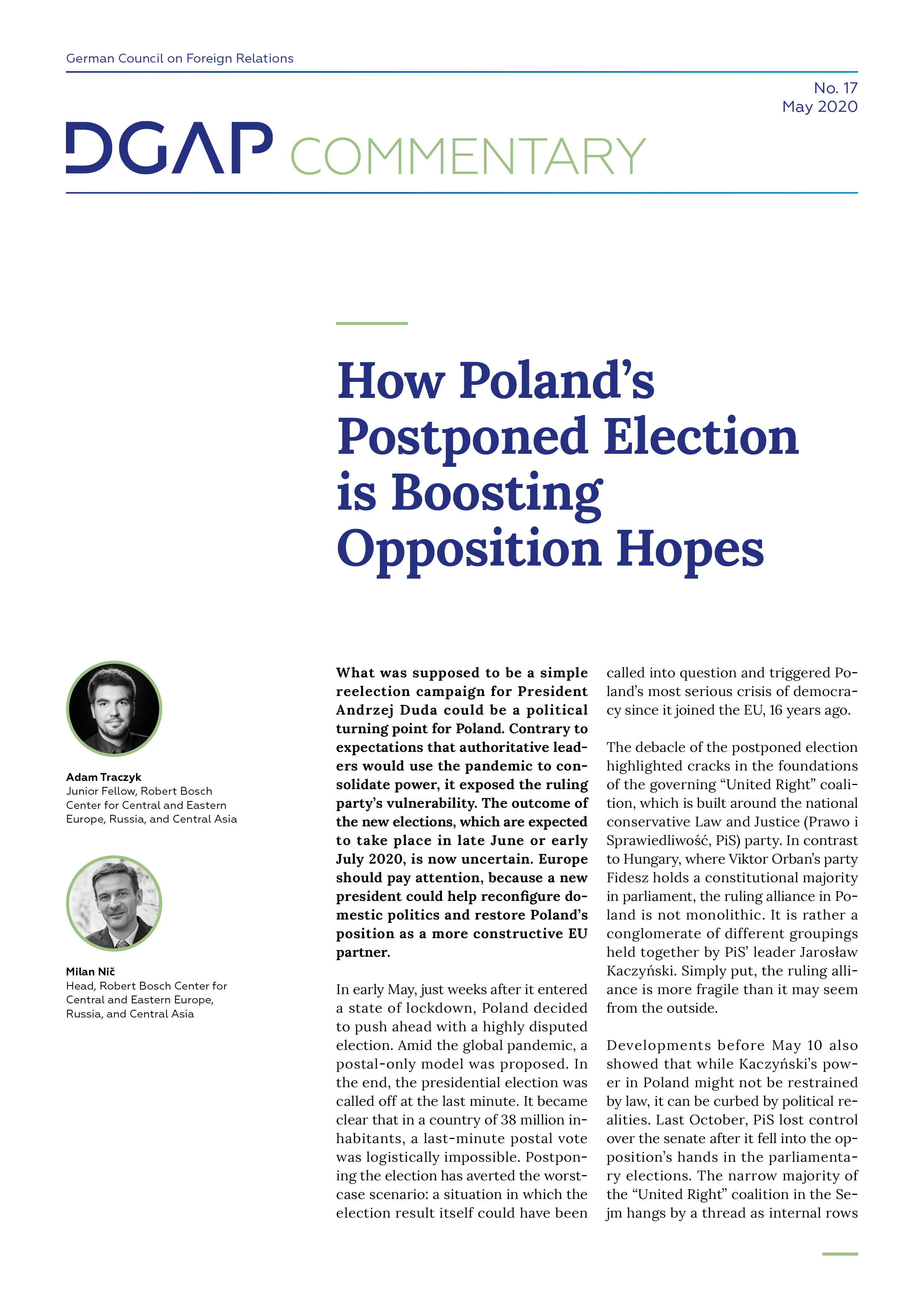In early May, just weeks after it entered a state of lockdown, Poland decided to push ahead with a highly disputed election. Amid the global pandemic, a postal-only model was proposed. In the end, the presidential election was called off at the last minute. It became clear that in a country of 38 million inhabitants, a last-minute postal vote was logistically impossible. Postponing the election has averted the worst-case scenario: a situation in which the election result itself could have been called into question and triggered Poland’s most serious crisis of democracy since it joined the EU, 16 years ago.
The debacle of the postponed election highlighted cracks in the foundations of the governing “United Right” coalition, which is built around the national conservative Law and Justice (Prawo i Sprawiedliwość, PiS) party. In contrast to Hungary, where Viktor Orban’s party Fidesz holds a constitutional majority in parliament, the ruling alliance in Poland is not monolithic. It is rather a conglomerate of different groupings held together by PiS’ leader Jarosław Kaczyński. Simply put, the ruling alliance is more fragile than it may seem from the outside.
Developments before May 10 also showed that while Kaczyński’s power in Poland might not be restrained by law, it can be curbed by political realities. Last October, PiS lost control over the senate after it fell into the opposition’s hands in the parliamentary elections. The narrow majority of the “United Right” coalition in the Sejm hangs by a thread as internal rows between technocrats and hardliners threaten to break apart the ruling alliance. It remains to be seen if Kaczyński will be able to maintain the balance between the different groups and hold the “United Right” together. Regardless of the final result of the presidential race, he has a difficult task on his hands.
A Failed Election Back on Track
PiS initially wanted to hold the presidential election on May 10 at any cost. Even despite the risks connected with the coronavirus pandemic and numerous legal and logistical hurdles regarding how citizens could safely vote without threatening public health. The leadership of PiS believed that with time, the anticipated economic fallout caused by the pandemic could hurt Andrzej Duda’s chances for reelection.
But it was not as simple as PiS had hoped it would be. Jarosław Gowin, the leader of Agreement (Porozumienie), one of Law and Justice’s small coalition partners, rebelled against this plan, backed up by a handful of MPs loyal to him. Because the ruling coalition holds a very slim parliamentary majority of only five seats, and because the PiS leadership failed to convince any of the opposition MPs to change sides, Gowin had his way. In this political game of chicken, it was Kaczyński who swerved first to avoid a potentially fatal head-on collision that could have broken the ruling coalition apart, right before the election.
Polls conducted ahead of May 10 indicated that a significant number of opposition voters planned to boycott the election. Therefore, polls indicated that President Duda, backed by PiS, would be almost guaranteed to secure the presidency in the first round by winning more than 50 percent of the votes. More recent polls have shown that if the election were to be held in normal conditions, the current president could count on the support of slightly more than 40 percent of the voters. That still places Duda on pole position, but raises the possibility of a run-off with the leading opposition candidate. The race for the presidency is becoming more and more competitive.
Assuming that the new electoral law, which will allow both in-person and postal voting, restores the standards of a fair and free election, postponing the vote to early summer could have a tremendous impact on the outcome of the presidential race. The postponement of the elections has also brought about important shifts in the opposition camp. The biggest opposition party, the centrist Civic Platform (Platforma Obywatelska, PO), has already seized the opportunity to swap Małgorzata Kidawa-Błońska, who was falling in the polls, for the popular mayor of Warsaw, Rafał Trzaskowski.
Polls are already showing Trzaskowski as the front-runner among the opposition candidates; he is projected to win just under 20 percent of the vote. Other notable contenders to challenge President Duda in the run-off are Szymon Hołownia, a former television host and Catholic humanitarian activist with two-digit support, and until recently, Władysław Kosiniak-Kamysz, the dynamic leader of the small Christian-democratic Polish Peasants’ Party (Polskie Stronnictwo Ludowe, PSL). However, support for Kosiniak-Kamysz dropped to single digits after Trzaskowski entered the race.
Clashing Over Europe
Regardless of which candidate will challenge President Andrzej Duda in the run-off, it will be a neck and neck race as most opposition voters will throw their support behind any of Duda’s challengers. One of the main battlegrounds on which the opposition candidate will clash with Duda is Poland’s attitude towards Europe. A recent public opinion poll conducted by the European Council on Foreign Relations (ECFR) showed that over half of Duda’s supporters believe that Polish values are under threat in the EU, and that in today’s world, Poland must primarily rely on itself. Meanwhile, as many as two-thirds of Civic Platform and Polish People’s Party supporters want Poland to rely on the EU. In the past, President Duda has compared Poland’s membership in the EU with past occupations by foreign powers. Although the three opposition candidates have similar world-views – with center-right Trzaskowski being the most liberal among them – whichever candidate advances to the run-off alongside Duda could have at least a medium-term impact on the Polish political landscape.
Breaking with the Two-Party System?
The Duda-Trzaskowski confrontation would be yet another installment of Poland’s old and deeply polarizing rivalry between the same two political parties. It is a political confrontation that has been poisoning Poland for the last 15 years ever since Lech Kaczyński and Donald Tusk competed for the presidency in 2005. But that could change.
Both Hołownia and Kosiniak-Kamysz may have the potential to break this pattern and bring about some renewal of the Polish political system. If one of them makes it to the second round, it could break the dominant duopoly that has characterized Polish politics for years and rearrange the landscape of Polish political parties. Kosiniak-Kamysz, whose supporters mostly hail from the countryside, has gained some momentum in larger cities. He could even attract voters disappointed in the ruling party. Hołownia, on the other hand, is somewhat a political novice. He fits into a wider phenomenon of young political outsiders who capitalize on voters’ fatigue with traditional political elites. He is capable of mobilizing the youth vote, attracting voters from different political camps, and even reaching out to non-voters. For all this, his chances to reach the run-off may be undermined by lacking a broad and loyal voter base.
Changing of the Guard
All three opposition candidates also represent another trend: long overdue generational change in Polish politics. Trzaskowski (48), Hołownia (43), and Kosiniak-Kamysz (38) signal a break from the traditional “old guard” of Polish politics. As illustrated by recent developments in neighboring Slovakia, generational change could be an emerging regional phenomenon in Central Europe as accumulated frustration with blunders and arrogance of populist governments act as a boon to young leaders and new political forces.
A potential victory of one of the opposition candidates would further limit the government’s room for maneuver and add to the internal fighting in the ruling camp. It could even be a tipping point that leads to a new parliamentary election.
Although most presidential powers are symbolic, the president is still by far the most decisive veto-player in the Polish political system. His or her veto can be overruled only by a qualified majority of three-fifths. This means that even if the nationalist conservative government of Mateusz Morawiecki were to continue in power, it would have to find a way to work with a president who could safeguard checks and balances, challenging the PiS model of government more than anything else since the election of 2015. Although the president’s foreign policy competences are limited and subordinate to the government, the head of state in Poland could force domestic politics onto a more moderate track and put his stamp on foreign policy.
What it Means for Europe
Postponing the elections in Poland helped the country to narrowly avoid a spectacular failure and a deep constitutional crisis. It also spares the European Union a serious internal problem. The European Commission has already launched numerous infringement procedures including Article 7 over Poland’s rule of law and judicial reforms. Holding a potentially illegitimate election would top all former clashes. Postponing the election allows EU leaders to prioritize far-reaching decisions about Europe’s economic recovery, rather than worrying about its fifth largest country challenging the EU’s cohesion and values.
With Duda reelected one should not expect any major European policy shifts as his foreign policy priorities will likely continue to focus on transatlantic relations and the Three Seas Initiative. But a new Polish president might try to act more constructively towards EU partners and seek to rebuild and reframe Poland’s participation in the EU. A new president could even herald Poland’s return as a more active and constructive partner at a time when the future course of EU integration, amid a pandemic and the worst recession of our lifetime, is being decided.


